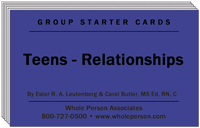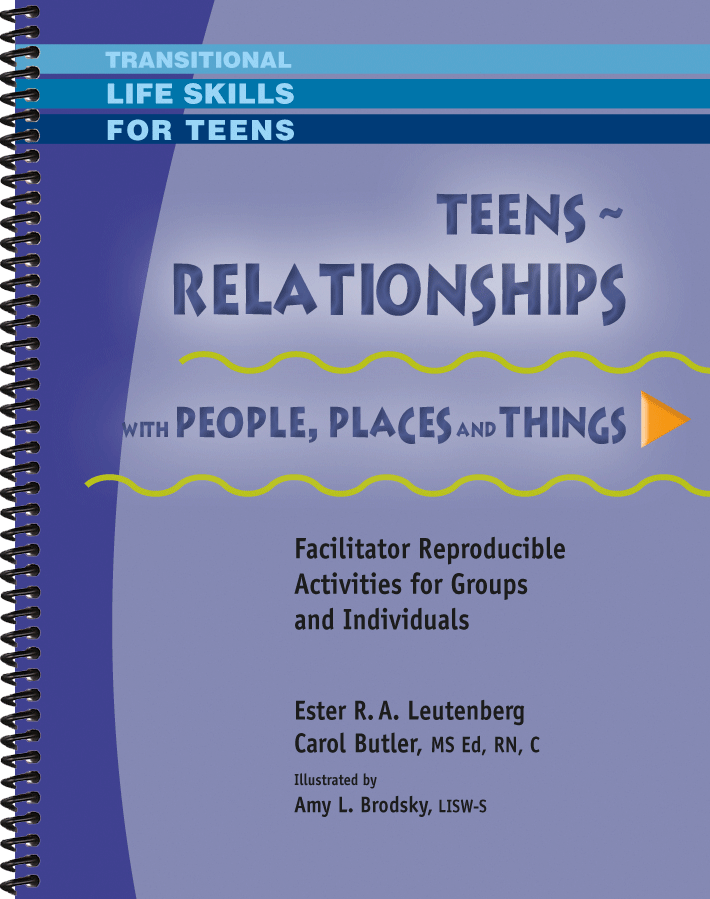Teens - Relationships with People, Places and Things
Facilitator Reproducible Activities for Groups and Individuals
Teens usually connect the word relationships only with other people. The activities in Teens - Relationships with People, Places and Things, will help teens explore their relationships in all facets of their lives, and they will discover which are healthy and which ones need change. Teens will learn skills they will use throughout their lifetime to build and maintain healthy relationships.
This workbook covers the following teen connections:
- Family /People at Home – primary experiences that affect teens’ views of how people live their lives.
- Peers – possibly the most influential people during adolescence.
- Romantic Partners – first love that awakens and intensifies emotions.
- Places – physical locations, memories, and impact.
- Tangible Things – money and materialism, and their degree of importance in teens’ lives.
- Intangible Things – ideas, traits, and influences that contribute to character.
- Self – a powerful relationship that affects all other alliances.
The seven chapters include:
- My Relationships with Family/People at Home
Ways to deal with secrets, conflict, control, etc., and how to build love, resilience and trust; how teens wish to be treated and their treatment of caregivers; skills to stop power struggles, problem solve and compromise; dynamics in many types of families, bonds that link, in whom to confide, forgiveness, etc.
- My Relationships with Peers
Ways to minimize jealousy and enmeshment, expand social supports and personal development; fear of missing out; cliques; embarrassment; cookie cutter categorizations; inclusion, possible motives of people who exclude, invisible scars left by cruelty, how to leave marks of hope and healing, etc.
- My Relationships with Romantic Partners
Healthy and unhealthy romance, ways to recognize and stop dating violence and other abuse, relationship costs and benefits; how to emerge stronger and wiser after a break up, respectfully initiate a break up, argue agreeably, understand jealousy, decide what love is and isn’t; amusement ride analogies, etc.
- My Relationships with Places
Positive and/or negative effects of one’s most memorable home; places likely to foster optimal development or have detrimental effects; how attitudes toward school affect experiences, ways to work on solutions, not dwell on problems; how one’s place of mind affects peace of mind, etc.
- My Relationships with Tangible Things
Technology’s social, emotional, educational, and other uses and abuses; whether money talks (or NOT); prized possessions, whether one owns or is owned by belongings, materialism, and objects with little monetary value but much meaning, etc.
- My Relationships with Intangible Things
How to make the most of time and life, freedoms and responsibilities, when to conform or not; pros and cons of competition and cooperation; the magnitude of small acts of kindness, compassion’s benefits to others and oneself; beliefs, little things that are big, things that are broken, silent things that are loud, etc.
- My Relationship with Myself
Self-image and actualization; ways to support not sabotage oneself; how thoughts affect feelings; how to filter out destructive and constructive criticism; ways words can hurt or heal; the value of esteem-able actions; mental and physical health, etc.
This workbook is also available in PDF eBook format, making it simple to store on your computer or mobile device and to access with a PDF viewer. The PDF format allows you to easily print copies of the activities and worksheets during therapy and counseling sessions.
 Teens – Relationships Card Deck
Teens – Relationships Card Deck
Use the open-ended questions with groups or individuals to kick-start a session. Each question corresponds to a specific page in the book.
Sample Questions:
Some people treat strangers better than family. In what ways is this true or untrue about you?
Are you more like a cookie cutter person or someone who does not “fit the mold”? Explain
What are the best words you have ever said?


